- Home
- Richard Matheson
Hunted Past Reason Page 10
Hunted Past Reason Read online
Page 10
"Let's head for that cliff," Doug told him. "Could be a cave there. We'll have to move a little faster though. No way of telling how soon the storm's going to hit."
"Can we eat soon?" Bob asked. "I'm pretty hungry."
"Cave first, lunch second," Doug said. "Let's go. Keep up with me now. And if you think a lightning strike is imminent get down as low as you can, sit or crouch on your pack to avoid ground currents."
Oh, God, this is a fucking nightmare, Bob thought.
Doug had turned to the left and started toward what looked to Bob like a good-sized mountain. His stride was rapid. As the undergrowth thinned and the stands of trees began to diminish, he moved faster and faster. Bob did his best to keep the same distance between himself and Doug but kept falling farther and farther behind. Should he call after Doug and ask him to slow down? He did agree that they'd need some kind of shelter if it was going to rain hard, especially if there was going to be lightning. Still, he found himself getting more breathless by the minute, partially because of the speed Doug was going, partially because the pack felt so heavy. In addition, he was becoming increasingly aware of the ache in his side and the pain of the blister on his foot. Can't we just set up the tent? he thought.
Fortunately, the ground, as they approached the foothills, grew more and more open and he was able to keep Doug in view even though the distance between them was getting constantly larger. Doug never looked back.
Does he even care if he loses me? Bob wondered. Why, oh why, did I ever decide to write this goddamn novel? Marian was right, a hundred percent. They could be lolling on a Hawaiian beach right now, sipping— what had she suggested?— yes, chi-chis. Instead, here he was lurching and limping as fast as he could through a national forest, trying to overtake Doug while an impending thunderstorm gathered overhead.
It was impending too, he saw, wincing. Now that he was almost out in the open, starting to move up an incline (which only made him more breathless, more tired, more achy), he could see that the sky was darkening rapidly, the huge cloud drifting over them. Oh, Christ, don't let it start before we find a cave or something, he thought.
Up ahead, Doug turned to look back. "Use a rest step!" he called.
"A what?!"
"Rest step, rest step!" Doug said impatiently. "Lift your left leg, move it forward, and put it down with no weight on it! Pause a few seconds, keeping all your weight on the right foot! Then shift your weight to the left leg and move the right leg forward, with no weight on it! Then start with your left leg again! You got it?!"
"Yeah! Yeah." Bob had only a limited idea of what Doug was talking about but didn't want to ask for a repeat explanation. He wanted to find that cave— assuming it existed— before the deluge hit.
He continued up the slope, trying to approximate what Doug had told him and having little success. He grimaced, listening to the roll and mutter of thunder that seemed to get closer every minute.
His right hand was leaning on a boulder, trying to brace himself as he climbed, when there was a tremendous roar overhead and, suddenly, a blinding flash of light that made him gasp, then cry out in stunned terror as he felt an electric shock run up his arm on the boulder. I've been struck by lightning! he thought in shock. He shuddered, horrified, seeing that the hand that had been on the boulder looked ashen with a bluish-gray tinge. I'm going to die! he thought. He felt himself slip to one side and crumple to the ground. I'm paralyzed, he thought with a sob. Dear God, I'm paralyzed!
It seemed as though, almost instantly, Doug was kneeling by him, a look of concern on his face. "Jesus, Bobby, you got hit by lightning."
"No kidding," he said weakly.
"Can you move your arms and legs?" Doug asked.
Bob tried, and with some help from Doug, who rubbed and moved his arms and legs, he found that he wasn't paralyzed after all. "Jesus Christ," Doug said, strangely amused it seemed— it must be relief, Bob thought. "When I heard that boom and saw that flash and heard you scream—"
"I screamed?" Bob murmured.
"Like a stuck pig," Doug said. Bob could see now that his smiles of amusement were relief. "Then, when I saw you flop on the ground, I thought, Oh, Jesus Christ, what am I going to tell Marian, I took your husband on a hike and got him killed by lightning? Jesus!" He shook himself as though ridding himself of dismay. "Whoa," he said, "I don't know why you weren't fried. I'm glad you weren't though."
"So am I," Bob muttered. Jesus Christ, he thought. Struck by lightning. How could such a thing happen?
He jumped as another roar of thunder sounded overhead. Doug pulled him up. "Crouch on the balls of your feet," he said quickly.
He had barely done so when another bolt of lightning flashed, this time farther away.
"We'd better get to that cave," Doug said.
"What cave?" Bob asked.
"There's one not far up," Doug said. "Come on."
It suddenly began to rain. "Oh, boy," Doug said.
He helped Bob put on his poncho, then threw on his own. "Let's go," he said. He chuckled unexpectedly, reaching out to touch one of Bob's eyebrows. "They got singed," he said.
Bob grunted and they started up the slope. The pack seemed to get heavier with every stride. He still felt dazed and unreal after the lightning strike. He screwed his face into a grimacing mask as they climbed, starting at each crash of thunder, each crackling flare of lightning. Will this ever end? he thought. Have I died and gone to hell? He swallowed dryly again and again. Believing in life after death wasn't much of a comfort when you didn't know if that death was coming at any second— sharply, violently, unexpectedly.
"Hold on," Doug told him as they reached the cave.
"Why?" he asked but his voice was drowned out by a roar of thunder. As quickly as he could, he pulled off his pack to sit on it. Before he could get it off, a bolt of lightning struck about a hundred yards away. Thank God for that, he thought.
Why can't we go in the cave? he wondered. He was getting soaked.
A few seconds later, he knew why as Doug emerged from the cave, a headless, flopping rattlesnake in his left hand, the golak in his right. Oh, Jesus, he thought, seeing how big the snake was as Doug flung it away. He grimaced at himself. Marian, don't ever listen to me again, he thought.
They were in the cave now. It was reasonably big and Doug had placed their packs away from them so the metal frames couldn't conduct electricity if lightning hit near the cave. He had placed their sleeping pads and sleeping bags under them to insulate them against ground shock and told Bob to keep his hands off the ground. Bob's appetite seemed to be considerably lessened by the lightning strike. He wondered if there had been damage to any of his organs. His hand still looked a little ashen although the bluish-gray tinge had faded. I survived a lightning bolt, he kept thinking. Maybe he should write an article for the Enquirer: "Author Struck by Lightning and Survives!"
He tried to listen to what Doug was telling him, probably to get him back to feeling normal after what had happened. But he kept drifting off mentally, unable to get over what had happened. Doug had said something about how ordinarily a cave was the worst place to be in a lightning storm but this one was okay because of its height and depth, six to seven feet in each dimension. Any smaller and lightning was actually attracted to caves; something like that.
The only thing Doug said that stayed with him was his account of a forest ranger named Roy Sullivan who more than earned the nickname "Dooms," because he'd been struck by lightning seven times over a period of thirty-five years, one strike even setting his hair on fire and heating his body so much that he had to pour a pail of water over his head.
"But none of them killed him," Doug finished his story. "He died of something else entirely."
"That's comforting," Bob said.
It didn't help much when Doug informed him again that a cave wasn't really all that safe a spot in a lightning storm. Or when he told Bob that he should listen for high-pitched zinging sounds because they indicated that a strike was ne
ar.
"Did you know that the odds of being struck by lightning are one in six hundred thousand?" he asked.
"No, I didn't know," Bob answered wanly. "Nice to know I'm special."
He made the mistake of asking if they could set up the stove so he could make himself some soup.
"Put a metal stove right next to us in a lightning storm?" Doug said.
"No, of course not," Bob replied, nodding feebly.
Doug patted him on the back. "You're a lucky man, Bobby," he said. "You were only splashed by the lightning. If you'd been hit directly, two or three hundred million volts would have gone through you."
Bob shivered. I'd rather not hear any more about lightning if you don't mind, he thought.
"If that had happened, you'd probably have amnesia, be temporarily blind or deaf, your blood vessels spasmed, your skin mottled. You were lucky."
"Yeah," Bob said, "I feel lucky."
The thunder and lightning had passed but it was still raining hard.
Doug set up the stove and heated soup for the two of them. That it was his soup didn't bother Bob. He sighed in pleasure as he ate it with crackers. Bob used his pot to boil some water for coffee. Bob felt a lot better with some hot soup in his stomach and sipping on a cup of hot, sweetened coffee, eating some oatmeal-raisin cookies with it. He still felt disoriented by the shock he'd gotten but— remarkably he was certain— he hadn't been really injured in any way.
To his surprise, Doug took a small flask from his pack and unscrewed its cap. "Some brandy in your coffee?" he asked.
"I thought alcohol impaired the judgment," Bob needled him without thinking.
Doug looked at him askance. "You want some or not?" he asked.
"I want some definitely," Bob answered. "It can't impair my judgment any more than being struck by lightning."
Doug chuckled. "That's for sure," he said, pouring a small amount of brandy into Bob's cup. "Anyway, I only thought you weren't used to backpacking and the vodka might make it more difficult for you."
"Got ya," Bob said. He raised his cup in a toast. "To you, Douglas."
Doug smiled a little. The hot, brandy-laced coffee tasted wonderful to Bob, making him sigh.
"Well, the weather's giving you a chance to rest, isn't it?" Doug said.
"For which I am intensely grateful to the weather," Bob responded.
"Well, I just hope Marian doesn't get upset if we don't get to the cabin when she expects us," Doug said.
Oh, that's right, Bob thought; it would worry her. He sighed. "Well, I guess it can't be helped," he said.
The gas flame of the stove, now turned off, had warmed the cave a little. It seemed cozy now, especially with the brandied coffee warming his stomach. He leaned back against his pack, sighing with pleasure.
After a few minutes, he looked over at Doug, feeling, for some singular reason, a sense of affection for him. Sure, there was still that pain-in-the-ass quality to his behavior, and their politics were worlds apart. Still, Doug was taking him on this hike after all and he had seemed genuinely concerned about the lightning strike— correction, splash, he told himself.
Now he felt a genuine curiosity as to what had made Doug the contradictory man he was. He'd never asked before. The only times he'd been with Doug was when the two couples were together. Now he was alone with him, he felt warm and comfortable (if still a little woozy) and wanted to know more about his hiking companion than he knew. For that matter he knew nothing at all about Doug beyond his animated social behavior and his rather overbearing conduct during this hike.
"Tell me about yourself," he said.
"Tell you about myself?" Doug turned it into a question.
"Yes," Bob said.
"Tell you what?" Doug asked.
"Your childhood, for instance," Bob replied.
"Oh, you don't want to hear about that," Doug told him.
"Why not?"
"Because it was a fucking nightmare," Doug said.
"That bad." Bob wondered if he'd made a mistake bringing up the subject. He'd only wanted to learn a little more about Doug. But, instead, if he'd opened up old wounds . . .
"I'm sorry, I didn't mean to pry into—"
"My childhood," Doug said as though he were reading the title of a book. "By Douglas Crowley, formerly Douglas Crowlenkovitch."
"That was your name," Bob said, surprised. "I presume you changed it when you became an actor."
"Obviously," Doug said. He took a sip of his coffee and sighed. "Well, it wasn't anything like your childhood, that I'd bet on."
"Where did you grow up?"
"On the outskirts of Pittsburgh," Doug answered. "My old man was a steel worker."
"Were you an only child?" Bob asked.
Doug made a sound of scornful amusement. "I should be so lucky."
"How many of you were there?"
"Four sisters and me," Doug said. "They got the princess treatment, I got treated like some dog they'd found in a lot."
"Really?" Bob said, wincing.
"Yes, really," Doug said; sounding almost contemptuous. "They had the two extra bedrooms, I had the cellar."
"The cellar?" Bob looked at him in pained amazement.
"That's right. While you had a nice room all to yourself, I'm sure, my old man threw up some plywood and made me a— what would you call it?— a cell, an enclosure, a fucking closet? You can imagine how cold it got down there in the winter. The only time it was comfortable was in the summer."
"Jesus." Bob looked distressed at the image Doug had created in his mind.
"Jesus was nowhere around," Doug said. "Just my old man and my mother— who was drunk most of the time."
"Oh, for God's sake," Bob said, wincing again.
"He wasn't around either." Doug's smile was thin and bitter. "My old man used to beat the shit out of me," he said.
"Why?" Bob asked.
"Why?" Doug repeated. "For any damn thing he wanted to. Bad grades in school. Not doing my chores fast enough to suit him. Once, one of my sisters came on to me. She was lying naked on my cot, telling me to fuck her when my old man found us. Who got blamed? Her? My ass. It was all my fault. She was thirteen, I was nine, but it was my fault and he got that old belt out toot sweet and walloped my bare ass until I couldn't sit down for three days. Bastard. And what about Lenora? She cried tears like the professional crocodile she was and got away with the whole thing— even my mother bawled me out. I wasn't too crazy about Lenora after that. For that matter, none of my sisters cared much for me. My oldest sister Angela wasn't too bad; she, at least, stood up for me once in a while. But not very much."
"Did your father drink too?" Bob asked.
"Not during the week, he had to work," Doug said. "But on weekends . . . watch out. That's when I got most of my beatings. He beat my mother up once in a while too. But never the girls. I don't know what the hell kept him clear of them. Hell, maybe he was screwing them, it wouldn't surprise me a bit to find out that he was."
Bob didn't know what to say. He really was sorry now that he'd brought up the subject. Then, again, maybe it was doing Doug good to let out some of his painful memories.
"When did you leave home?" he asked.
"House, you mean," Doug said. "It was never a home." He paused to take a drink of his coffee, then went on. "I was about fifteen. I'd become a real 'tough guy' by then. Hung out with 'the wrong crowd,' don't y'know. Got caught trying to rob a liquor store with a couple of my buddies. We all got sent to a reformatory. I was there two years. Got raped a dozen times or so until I beat up the 'big guy' there. Then they left me alone. Would you believe that's where I got into acting?"
"How so?" Bob asked, surprised.
"Some jerky social worker started a dramatics program there. Most of the guys thought it was only for fags but I tried it and I liked it. That got some of the other guys into it too— they knew I wasn't a fag. So we put on shows and I found out I was pretty damn good at it. So after I got out, I went to Philadelphia, got a
job in a lumberyard, and went to acting school."
"That's very interesting," Bob said.
Doug looked at him suspiciously. "You jerking my chain?" he asked.
"Well, I don't know what that means," Bob answered. "But if it means am I pulling your leg, no, I'm not. I think what you've told me is very interesting. You've survived a lot of hard times."
"That's for damn sure," Doug said.
"So when did you come to California?" Bob asked then.
"Went to New York first. Another acting school— I couldn't get into The Actors Studio; guy who ran it didn't like me. But I got a few parts in off-Broadway shows. Enjoyed the hell out of it because I had my choice of all the actresses; most guys in acting companies are queer. Which is amusing because most of the so-called famous lovers of the stage are queer— which, of course, the audience doesn't know."
"What brought you to the coast?" Bob asked.
"Some Hollywood agent saw me and told me I should come to Los Angeles; he thought he could get me some television work." He exhaled hard. "End of story," he said. He looked outside. "If it doesn't stop raining soon, we'd better try to move on anyway."
"Oh, all right." Bob didn't want to leave the comfort of where they were but knew that Marian would start to fret if he was days late.
Doug poured some more hot water into his cup, added coffee powder to it, stirred it up, and added a little more brandy to the cup. "You want some more?" he asked.
Bob was going to say no, then thought: Oh, what the hell, it's making Doug more genial, making me feel good, and, most importantly, delaying their possible departure into the cold rain.
"Sure," he said. He made himself more coffee and Doug added a little brandy to his cup.
"So that's the story of my fucking life," Doug said. "Excluding a few minor details like my marriage to Nicole, my two kids, Nicole moving out on me, my total alienation from Janie, my acting career in the fucking doldrums, and my son—"
He broke off abruptly and Bob hoped the subject of Artie would be dropped. He knew the pain Doug still felt about it and knew that there was very little he could say to lessen that pain.

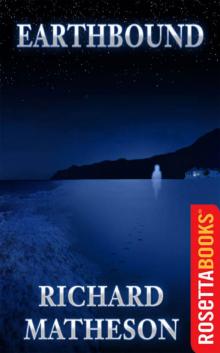 Earthbound
Earthbound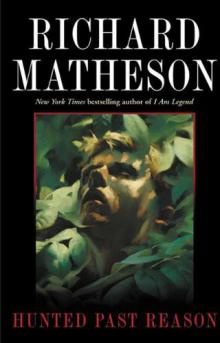 Hunted Past Reason
Hunted Past Reason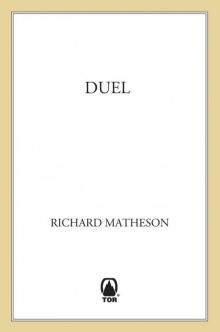 Duel: Terror Stories
Duel: Terror Stories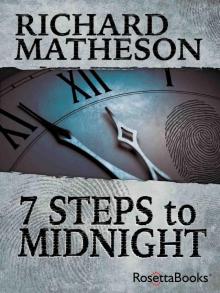 7 Steps to Midnight
7 Steps to Midnight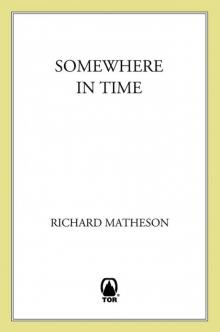 Somewhere in Time
Somewhere in Time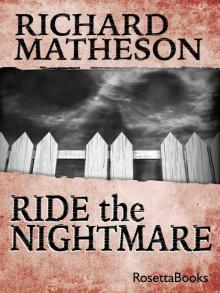 Ride the Nightmare
Ride the Nightmare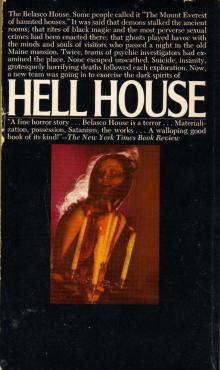 Hell House
Hell House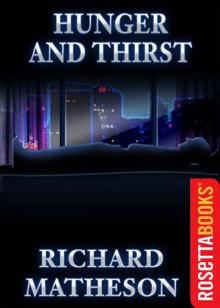 Hunger and Thirst
Hunger and Thirst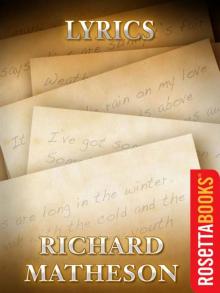 Lyrics
Lyrics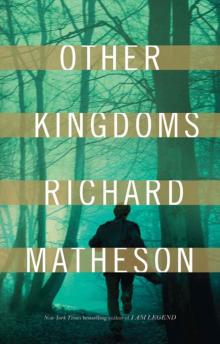 Other Kingdoms
Other Kingdoms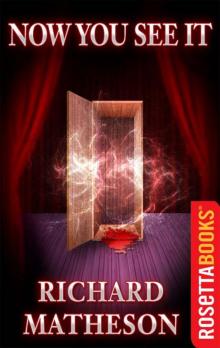 Now You See It . . .
Now You See It . . .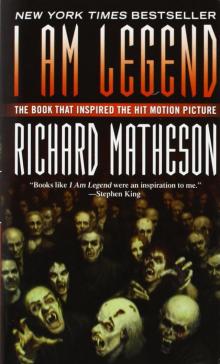 I Am Legend
I Am Legend The Box: Uncanny Stories
The Box: Uncanny Stories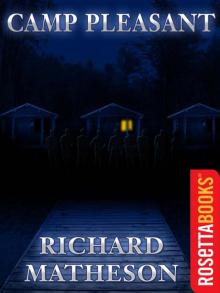 Camp Pleasant
Camp Pleasant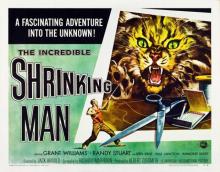 The Incredible Shrinking Man
The Incredible Shrinking Man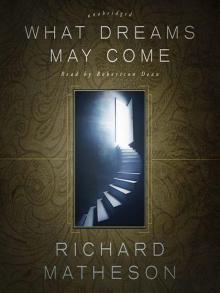 What Dreams May Come
What Dreams May Come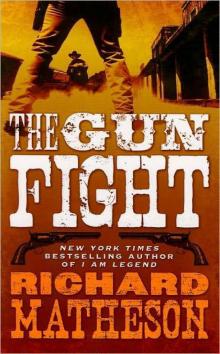 The Gun Fight
The Gun Fight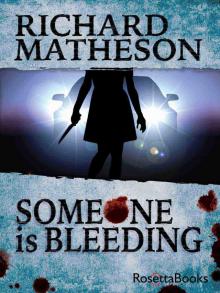 Someone Is Bleeding
Someone Is Bleeding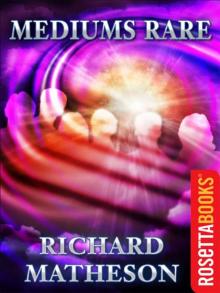 Mediums Rare
Mediums Rare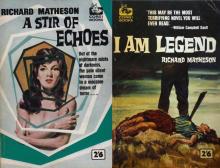 A Stir of Echoes
A Stir of Echoes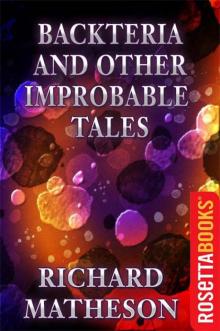 Backteria and Other Improbable Tales
Backteria and Other Improbable Tales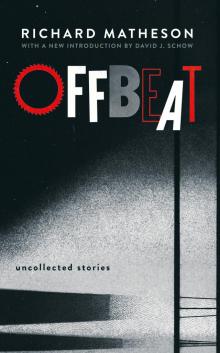 Offbeat: Uncollected Stories
Offbeat: Uncollected Stories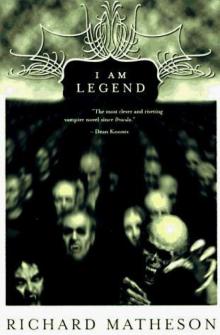 I Am Legend and Other Stories
I Am Legend and Other Stories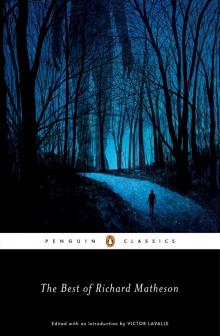 The Best of Richard Matheson
The Best of Richard Matheson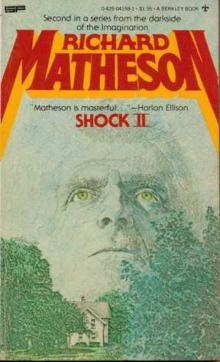 Shock II
Shock II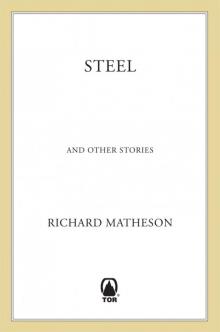 Steel: And Other Stories
Steel: And Other Stories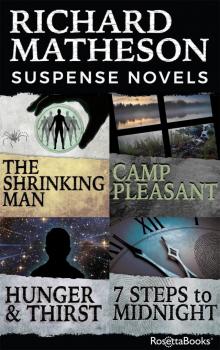 Richard Matheson Suspense Novels
Richard Matheson Suspense Novels The Link
The Link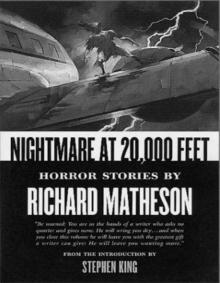 Nightmare At 20,000 Feet
Nightmare At 20,000 Feet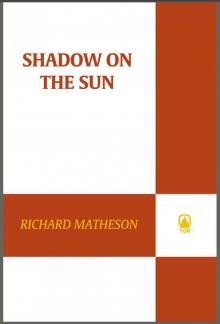 Shadow on the Sun
Shadow on the Sun![Steel and other stories [SSC] Read online](http://i1.bookreadfree.com/i/03/21/steel_and_other_stories_ssc_preview.jpg) Steel and other stories [SSC]
Steel and other stories [SSC] Created By
Created By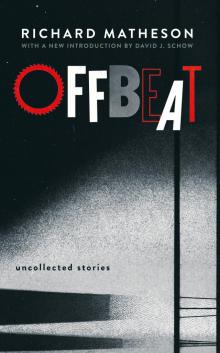 Offbeat
Offbeat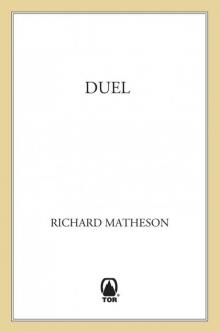 Duel
Duel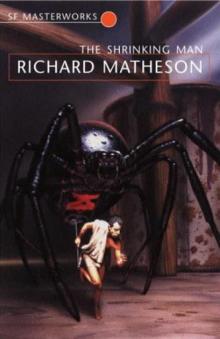 The Shrinking Man
The Shrinking Man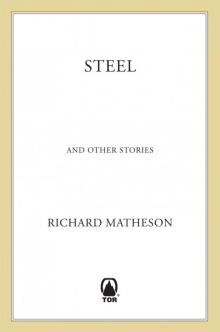 Steel
Steel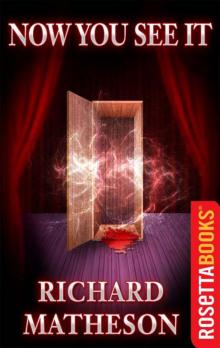 Now You See It
Now You See It